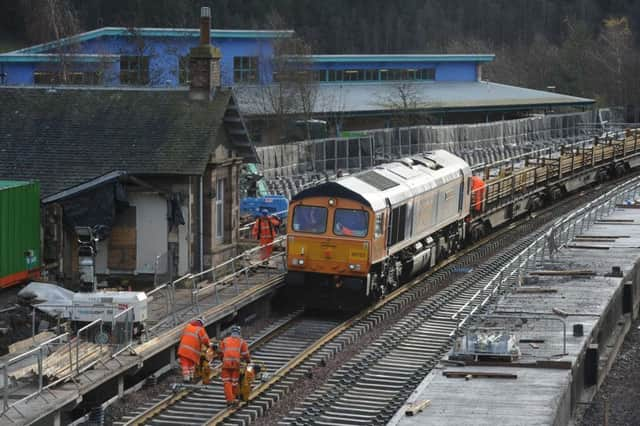It’s slow speed ahead for Borders rail commuters


Most trains will take longer than the promised 55 minutes between Edinburgh and Tweedbank, near Galashiels, with some completing the 35-mile trip in up to one hour six minutes.
The blow for commuters hoping for a speedy ride comes on top of the decision to operate ScotRail’s most unreliable trains on the route when it opens in September.
Advertisement
Hide AdAdvertisement
Hide AdIn addition, the timetable has indicated that six services are expected to be cancelled two days a week for the first six weeks to make room for steam trains because much of the line is single track.
The Scottish Government’s Transport Scotland agency, which is charge of the £350 million project, stated on its website: “The majority of end-to-end journeys will be achieved in 55 minutes or less.”
However, the just-published timetable showed that 42 of the 66 weekday services in either direction will take longer.
The average journey time is some 57 minutes – but 58 minutes on southbound trains.
Rail consultant David Spaven blamed the longer journeys on cutbacks to the project which he said also threatened to delay trains.
The author of Waverley Route said: “The writing was on the wall for the maximum 55-minute journey time promised in 2009 when Transport Scotland decided two years later to slash the provision of double track from 16 miles to 9.5 miles.
“A reliable 55-minute timetable became impossible. To ensure trains run as close to schedule as possible, Network Rail has been forced to add a time buffer.
“Even with this precaution, Network Rail and ScotRail will need to devote meticulous attention to train management.”
Advertisement
Hide AdAdvertisement
Hide AdNetwork Rail said the lengthened journeys were mainly caused by congestion on lines in Edinburgh.
Campaign for Borders Rail chairman Simon Walton said: “While the Borders Railway still represents a reliable, sustainable and much more productive means of travel than road, it would undoubtedly be an even more attractive proposition for commuters if the installed infrastructure allowed for faster journey times, particularly benefiting peak-hour commuters.
“The campaign repeatedly raised these issues on behalf of the communities to be served by the line before and during the construction phase, particularly noting the reduction in proposed double-track length and the obstacles to future enhancement such as new bridges designed only to permit a single track to pass underneath.”
A Transport Scotland spokesman said: “Transport Scotland presented the draft timetable last year, and was very clear that this was subject to industry processes, which have now been completed and agreement reached between Network Rail and operator ScotRail.
“The communities who will be served by the railway will welcome the news the opening timetable is now published and confirms daytime trains every half-hour through the week, and hourly on Sundays, as well as provision for the steam train experience.
He added: “In a matter of months, the people of Midlothian and the Borders will be able to enjoy the benefits of a railway for the first time in almost half a century, including an average end-to-end journey time of under an hour.”
The ScotRail class 158 diesel trains to be used on the route are nearly twice as unreliable as the type used on the main Edinburgh-Glasgow line.
They have a notorious record on other lines and the Highlands and Islands Transport Partnership co-ordinating body has said they had caused “well-documented problems” on routes such as Inverness to Aberdeen and Wick.
Dominic Booth, UK managing director of new ScotRail operator Abellio, has pledged to make “continuous improvement” to its trains but said there was “not a significant risk” of reliability problems.